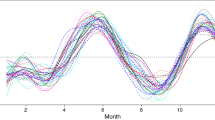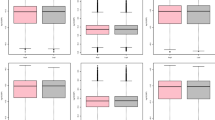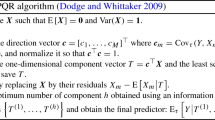Abstract
This paper considers a Bayesian approach for joint estimation of the marginal conditional quantiles from several dependent variables under a linear regression framework. This approach incorporates the dependence among different dependent variables in the regression model which studies how the relationship between dependent variables and a set of explanatory variables can vary across different quantiles of the marginal conditional distribution of the dependent variables. A Bayesian regularization approach with L\(_{1/2}\) penalty is adopted to conduct high-dimensional variable selection. Some simulation studies are conducted to evaluate the performance of our proposed method. We illustrate the proposed estimation approach using a real data set on energy efficiency with two responses.



Similar content being viewed by others
Change history
13 November 2021
A Correction to this paper has been published: https://doi.org/10.1007/s00180-021-01168-2
References
Aldrin M (1996) Moderate projection pursuit regression for multivariate response data. Comput Stat Data Anal 21(5):501–531
Alhamzawi R, Ali HTM (2018) Bayesian Tobit quantile regression with \(L_{1/2}\) penalty. Commun Stat-Simul Comput 47(6):1739–1750
Alhamzawi R, Algamal ZY (2019) Bayesian bridge quantile regression. Commun Stat-Simul Comput 49(3):944–956
Chen WP, Wu YN, Chen RB (2014) Bayesian variable selection for multi-response linear regression. In: International conference technologies and applications of artificial intelligence, pp 74–88
Eck DJ (2018) Bootstrapping for multivariate linear regression models. Stat Probab Lett 134:141–149
Fan J, Li R (2001) Variable selection via nonconcave penalized likelihood and its oracle properties. J Am Stat Assoc 96(456):1348–1360
Fragiadakis K, Meintanis SG (2011) Goodness-of-fit tests for multivariate Laplace distributions. Math Comput Model 53(5–6):769–779
Fu WJ (1998) Penalized regresssion: the bridge versus lasso. J Comput Graph Stat 7(3):397–416
Hoerl AE, Kennard RW (1970) Ridge regression: applications to nonorthogonal problems. Technometrics 12(1):69–82
Hurlimann W (2013) A moment method for the multivariate asymmetric Laplace distribution. Stat Probab Lett 83(4):1247–1253
Kim S, Xing EP (2012) Tree-guided group lasso for multi-response regression with structured sparsity, with an application to EQTL mapping. Ann Appl Stat 6(3):1095–1117
Kollo T, Srivastava MS (2005) Estimation and testing of parameters in multivariate Laplace distribution. Commun Stat-Theory Methods 33(10):2363–2387
Kotz S, Kozubowski TJ and Podgorski K (2001) Symmetric multivariate Laplace distribution. Asymmetric multivariate Laplace distribution. In The Laplace distribution and generalizations. Boston, MA: Springer pp 239–272
Koenker R (2005) Quantile regression. Cambridge University Press, Cambridge
Koenker R, Bassett J (1978) Regression quantiles. Econometrica 46(1):33–50
Kozumi H, Kobayashi G (2011) Gibbs sampling methods for Bayesian quantile regression. J Stat Comput Simul 81:1565–1578
Liang Y, Liu C, Luan XZ (2013) Sparse logistic regression with a \(L_{1/2}\) penalty for gene selection in cancer classification. BMC Bioinform. 14(1):198–198
Lestari B, Budiantara IN, Sunaryo S et al (2012) Spline smoothing for multi-response nonparametric regression model in case of heteroscedasticity of variance. J Math Stat 8(3):377–384
Li Y, Nan B, Zhu J (2015) Multivariate sparse group lasso for the multivariate multiple linear regression with an arbitrary group structure. Biometrics 71(2):354–363
Liang Y, Lu C, Luan XZ et al (2013) logistic regression with a \(L_{1/2}\) penalty for gene selection in cancer classification. BMC Bioinform 14(1):198–198
Luan XZ, Liang Y, Liu C et al (2014) A novel \(L_{1/2}\) regularization shooting method for Cox’s proportional hazards model. Soft Comput 18(1):143–152
Lue HH (2019) Pairwise directions estimation for multivariate response regression data. J Stat Comput Simul 89(5):1–19
Mallick H, Yi N (2018) Bayesian bridge regression. J Appl Stat 45(6):988–1008
Petrella L, Raponi V (2019) Joint estimation of conditional quantiles in multivariate linear regression models with an application to financial distress. J Multivariate Anal 173:70–84
Saran S, Gurjar M, Baronia A et al (2020) Heating, ventilation and air conditioning (HVAC) in intensive care unit. Crit Care. https://doi.org/10.1186/s13054-020-02907-5
Semeraro P (2020) A note on the multivariate generalized asymmetric Laplace motion. Commun Stat-Theory Methods 49(10):2339–2355
Simila T and Tikka J (2005) Multiresponse sparse regression with application to multidimensional scaling. International conference on artificial neural networks: formal models & their applications ICANN 2005
Tsanas A, Xifara A (2012) Accurate quantitative estimation of energy performance of residential buildings using statistical machine learning tools. Energy Build 49:560–567
Tibshirani R (1996) Regression shrinkage and selection via the Lasso. J R Stat Soc B 73(1):273–282
Tian YZ, Song XY (2020) Fully Bayesian \(L_{1/2}\) penalized linear quantile regression analysis with autoregressive errors. Stat Inferace 13(3):271–286
Visk H (2009) On the parameter estimation of the asymmetric multivariate Laplace distribution. Commun Stat-Theory Methods 38(4):461–470
Xu Z, Zhang H, Wang Y et al (2010) \(L_{1/2}\) regularization. Sci China Inf Sci 53(6):1159–1169
Yin X, Bura E (2006) Moment-based dimension reduction for multivariate response regression. J Stat Plan Inference 136(10):3675–3688
Zhang H, Xu Z, Wang Y et al (2014) A sharp nonasymptotic bound and phase diagram of \(L_{1/2}\) regularization. Acta Mathematica Sinica 30(7):1242–1258
Zhang Y, Zhu L, Ma Y (2017) Efficient dimension reduction for multivariate response data. J Multivariate Anal 155:187–199
Zou H (2006) The adaptive LASSO and its oracle properties. J Am Stat Assoc 101(476):1418–1429
Zou H, Hastie T (2005) Regularization and variable selection via the elastic net. J R Stat Soc B 67(2):301–320
Acknowledgements
Authors thank editors and referees for their constructive comments and suggestions which have greatly improved the paper. The research of Yu-Zhu Tian was partially supported by grants from the National Natural Science Foundation of China (grant 12061065, 11861042) and Science and Technology Program of Gansu Province (grant 21JR7RA135). The work of Man-Lai Tang was partially supported through grants from the Research Grant Council of the Hong Kong Special Administrative Region (UGC/FDS14/P01/16, UGC/FDS14/P02/18 and The Research Matching Grant Scheme (RMGS)) and a grant from the National Natural Science Foundation of China (grant 11871124).
Author information
Authors and Affiliations
Corresponding author
Additional information
Publisher's Note
Springer Nature remains neutral with regard to jurisdictional claims in published maps and institutional affiliations.
The original online version of this article was revised as the Grant number mentioned in the acknowledgment section was published incorrectly.
Appendix
Appendix
The posterior distribution (3.3) implies that the fully conditional posterior distribution of \(\beta _{\tau }\) is in proportion as follows
where \(N_{p\times k}(M,\Phi \otimes V)\) denotes a \(p\times k\) matrix normal distribution with parameters M, \(\Phi \) and V and \(\Phi _{k\times k}=\Big (\sum _{i=1}^{N}W_{i}^{-1}X_{i}X_{i}^{T}\Big )^{-1}\), \(M_{p\times k}=\sum _{i=1}^{N}(W_{i}^{-1}\eta _{i}X_{i}^{T})\cdot \Phi \), \(V_{p\times p}=D\Sigma D\), \(\eta _{i}=Y_{i}-D\theta W_{i}\).
The posterior distribution (3.3) implies that the fully conditional posterior distribution of correlation parameter matrix \(\Psi \) is in proportion as follows
where \(\alpha _{i}=Y_{i}-\beta _{\tau }X_{i}-D\theta W_{i}\).
The posterior distribution (3.3) implies that the fully conditional posterior distribution of correlation parameter matrix \(W_{i}\) is in proportion as follows
where \(\text {GIG}(\lambda ,\chi ,\psi )\) denote the generalized inverse Gaussian (GIG) distribution and its pdf is expressed as
where \(K_{\lambda }\) denotes a modified Bessel function of the third kind with index \(\lambda \) and the parameters satisfy \(\chi>0,\psi >0\).
Rights and permissions
About this article
Cite this article
Tian, YZ., Tang, ML. & Tian, MZ. Bayesian joint inference for multivariate quantile regression model with L\(_{1/2}\) penalty. Comput Stat 36, 2967–2994 (2021). https://doi.org/10.1007/s00180-021-01158-4
Received:
Accepted:
Published:
Issue Date:
DOI: https://doi.org/10.1007/s00180-021-01158-4




